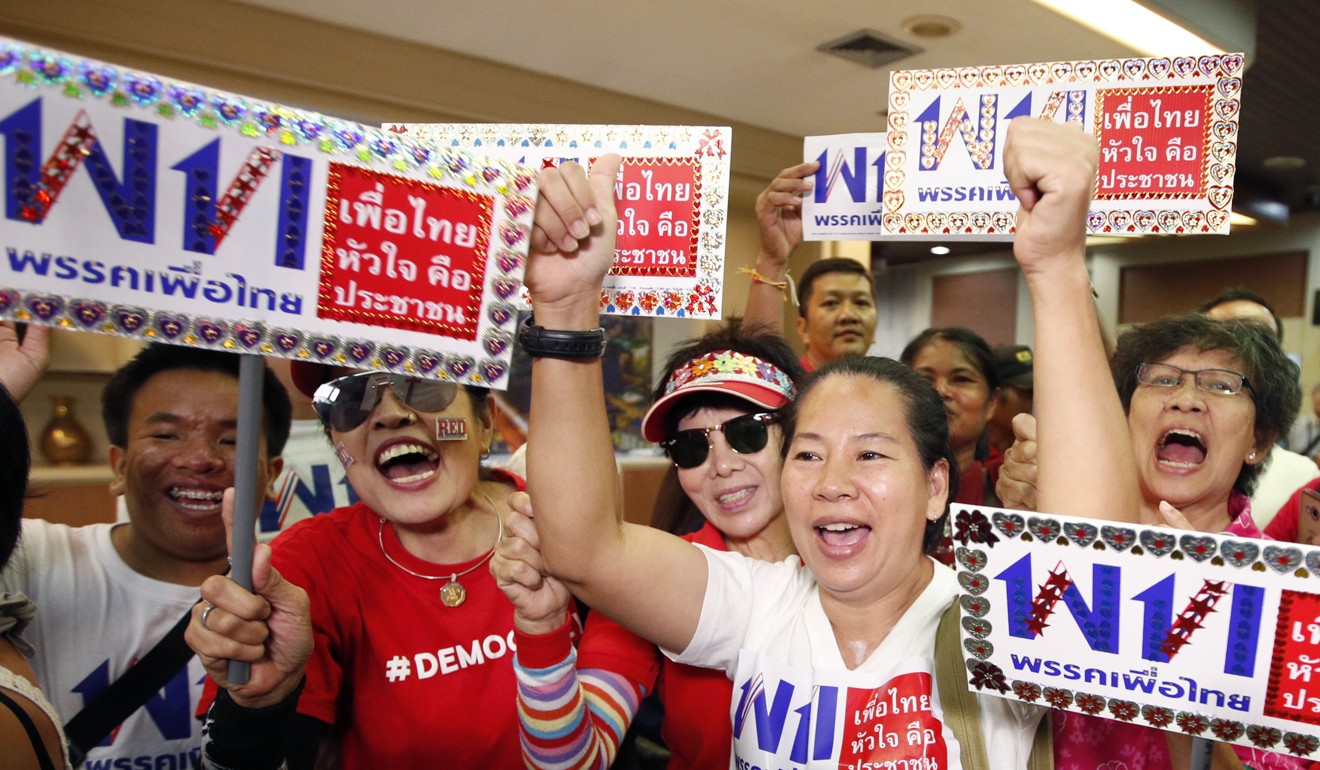
Thailand election: Confusion over party-list seat allocation sparks controversy
- Thailand is waiting for the election commission to unveil the allocation of party-list seats after its March 24 election
- Concerns are rising over the use of a new formula to determine how many seats contesting parties can obtain
But the commission is now finding the strategy has backfired, as frustrations mount over suspicions it may be using the seven-week window to manipulate yet-to-be-released “party-list” results in favour of the junta by tweaking a formula that determines how many seats contesting parties can obtain.
The former general’s Palang Pracharat Party, and the anti-junta Pheu Thai party linked to former prime minister Thakin Shinawatra, both say they won the March 24 vote. Unofficial results of the 350 parliamentary seats, released days after the polls, showed Palang Pracharat and Pheu Thai winning 97 and 137 seats, respectively.
The commission – which has said it cannot provide a projection of how the 150 party-list seats will be allocated until May 9 – is computing the seats under a controversial new formula that poll observers say is slanted against the Pheu Thai-led “Democratic Front” coalition.
In Thailand’s party-list system, seats are given a “value” set by the commission to determine how many seats parties are entitled to.
Thai election officials say 66 winners face disqualification
The system is designed to ensure that contesting parties which win sizeable number of votes, even if defeated, are represented in parliament. On the flip side, it also limits the number of party-list seats offered to large parties that win a majority in the constituency ward race.
Before the March 24 vote, a seat value was 71,000 votes. After the polls, it was lowered to 35,000. This means 11 small parties which did not meet the pre-election value would now gain seats. In turn, the number of party-list seats allocated to the Democratic Front will be reduced.

The sudden change in formula has sparked widespread confusion and fuelled concerns over vote manipulation.
The commission has repeatedly claimed the party-list muddle will not disadvantage pro-Thaksin forces – who won the last five elections and were toppled by the junta’s 2014 coup.
Thai election commission orders recounts, re-voting at eight polling stations
But some critics have questioned whether the sanctity of the vote would be hurt because of an “ex post facto”, or retroactive changing, of election rules.
“Ludicrous how nearly three weeks have passed since elections and the election commission has yet to be able to come up with a formula to compute and allocate party-list seats,” prominent columnist Pravit Rojanaphruk said on Twitter on Thursday. “Shouldn’t they have a formula readied before elections?”

According to law expert and political commentator Panat Tasneeyanond, such a problem did not exist in past elections in the coup-plagued nation – which has had six elections in 18 years – because a more streamlined method was used to compute party-list seats.
The junta, architect of the new 2017 charter under which the long-delayed polls were held, did away with a previous system where voters picked their constituency and party-list lawmakers on different ballot papers.
Taking at face value the commission’s insistence it is impartial, Panat said, the confusion could be down to a mismatch between the intention of the election rules drafter, and how it is actually being implemented.
Popular Thai politician Thanathorn fears military trial over sedition
Amid the controversy, the commission has asked the Constitutional Court to rule on the “calculation that may make some parties with votes lower than the average vote won gain one party seat” and whether such allocations are lawful, it said in a statement on Thursday.
The court has yet to set a date to hear the case, said a court official who asked for anonymity.

The party-list conundrum is just one of the issues that have raised alarm bells after the March 24 vote. Last week, two of the election’s breakout stars, Thanathorn Juangroongruangkit and Piyabutr Saengkanokkul from the Future Forward Party, were questioned over alleged criminal charges their supporters say are trumped up. Thanathorn is slated to face a military tribunal over his case.
The duo’s party stunned observers by finishing third in the elections, as it drew in support from first-time voters jaded by the country’s decades-old political stand-off between the Thaksin camp and pro-military forces.
Additional reporting by Reuters


